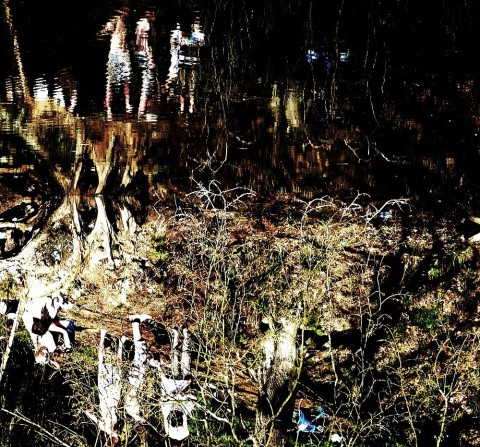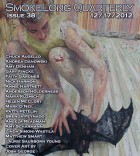One of these afternoons winter will dim the lights and settle down on us like tragic news. You have to accept it—understand life’s going to be different. You just hope the preparations you’ve made are enough, though you can never be too prepared in this part of the country. Last year, Karen and I didn’t know what to expect. We nearly froze to death. There are frostbite scars on the tips of our fingers and noses to prove it.
There was no catastrophe, neither natural nor manmade. With the way things are, you’d think droughts and untamable fires, or floods. Earthquakes and tsunamis. Tornadoes the size of Texas. Irreversible blackouts or a dark sky for years. But despite the end-of-the-world promises, by every expert from Stephen Hawking to Pope Benedict XVI, nothing happened. At least nothing they predicted. What did happen was the fear caused by those empty Apocalypse promises, then mass hysteria, mass suicide, genocide, race wars, millions rioting, millions murdering, beastly behavior. The concept of tomorrow dismissed.
Until you’re in that situation, you couldn’t imagine the conclusions you’d draw—the action you’d take. You can give hypotheticals that seem realistic now, but you don’t know. We took our neighbor’s twenty-four foot RV, thought we’d just drive until whatever happened, happened. After the President confirmed the rumors were, indeed, true, good neighbor Strychnined a jug of Sunny D and the whole family drank up. We ran out of gas on Lincoln Street Bridge that June, on what was supposed to be Last Day, and coasted the dead RV down the long bank of Salt Creek, out of sight. We swam naked and danced to Karen’s favorite Cyndi Lauper CD until the battery died. Stayed up all night, reminiscing, praying, making love. We cried at dawn. We thought we’d made either heaven or hell. Everything seemed different, brighter—the dirt and bridge girders. Once we’d finally slept and woken, we experienced the dark and nearly unbelievable realization we were alive.
Mendel’s been with us sixteen days—since he spotted the fire and stumbled on our camp with a pistol he assures us is fully loaded. That pistol he says has already killed a man. He says he used to be a logger in Oregon and way back when, he started casting bullets just to save money, but when police found his equipment that was an executable crime. He didn’t say how he’s still alive, but we’ve guessed in whispers. He walked east, sleeping anywhere, doing whatever for food. He turned south with the geese.
Karen’s on her knees in her old nursing smock, like a greasy worm deepening the trench we started sixty-eight days ago. It’s almost complete. She stabs the soil with a sharp stick, scoops the clumps of dirt into an ice cream bucket and tosses them out. When the trench is finished we’ll roll the RV in and reset the parking brake. We’ll mound that excavated dirt around the sides up to the roof, use the emergency hatch to enter and exit. We’ll survive this winter.
“Anybody can make money if that’s what they want to do, make money, to get it, have it, spend as you like, or don’t,” Mendel’s telling me as he works a bar of face soap from Embassy Suites on the seat of his transparent briefs. He’s just talking to talk, saying something he probably said all the time years ago. If he were to remove his green canvas belt with that pistol holstered to it, he’d be completely naked. He’s sitting back on his heels down where the concrete embankment under Lincoln Street Bridge meets the slow, silty water of Salt Creek. Police and firetrucks scream above us like an endless supply of bottle rockets. His blue jeans, tube socks, and flannel shirt are wrung damp and pressed flat on the concrete next to him.
Dressed, he looks fit, looks like he’s aged well, but like this you can see his skin’s all red webs; spine’s like the exoskeleton of some prehistoric serpent; ribs look already picked clean by the coyotes.
I’m fishing with line, curly in memory of its old spool, and a rusty treble hook. Every ten seconds or so I jerk the line, but have yet to snag anything eatable. What Mendel’s saying about money makes him insane, but I know at one time I would have agreed. At one time, we could have been friends.
I fish into the afternoon and catch nothing. We’ve been eating Trout, but they must have finally migrated to deeper water, maybe as far as the Missouri. They can sit under the ice there, graze sparingly on the riverbed. They’ll survive and in spring return to lay eggs between these rocks.
Karen has completed the trench. Mendel says, “So why you digging that anyway?” This is the first he’s mentioned of the thing, though I’ve caught him wondering about it. Clouds grow over the sun. Dusk comes before they clear. The three of us sit around the fire, Karen close to me. There is no reasonable explanation except the truth. I say, “We need the RV out of the wind.”
He’s said he doesn’t mind sleeping in his tent, but doesn’t know Midwest winters. He’d freeze out there, and Karen and I both know it. He says, “It get that cold here?”
“Not really,” Karen says.
The wind’s shifting, swirling. Those from the Tropics reversing. The fire’s a charmed snake and Karen’s the charmer—buckled over her folded arms, staring into the heat. She sings the opening to Cyndi Lauper’s song about girls only wanting to have fun. Her impersonation is spot on. The flames dip and sway between her words—to the absent pop beat.
Flits of snow begin floating around like cotton. No one acknowledges them, or the severe drop in temperature.
I join Karen in the chorus and Mendel croaks out the background vocals with a smile.



 The core workshop of SmokeLong Fitness is all in writing, so you can take part from anywhere at anytime. We are excited about creating a supportive, consistent and structured environment for flash writers to work on their craft in a community. We are thrilled and proud to say that our workshop participants have won, placed, or been listed in every major flash competition. Community works.
The core workshop of SmokeLong Fitness is all in writing, so you can take part from anywhere at anytime. We are excited about creating a supportive, consistent and structured environment for flash writers to work on their craft in a community. We are thrilled and proud to say that our workshop participants have won, placed, or been listed in every major flash competition. Community works.